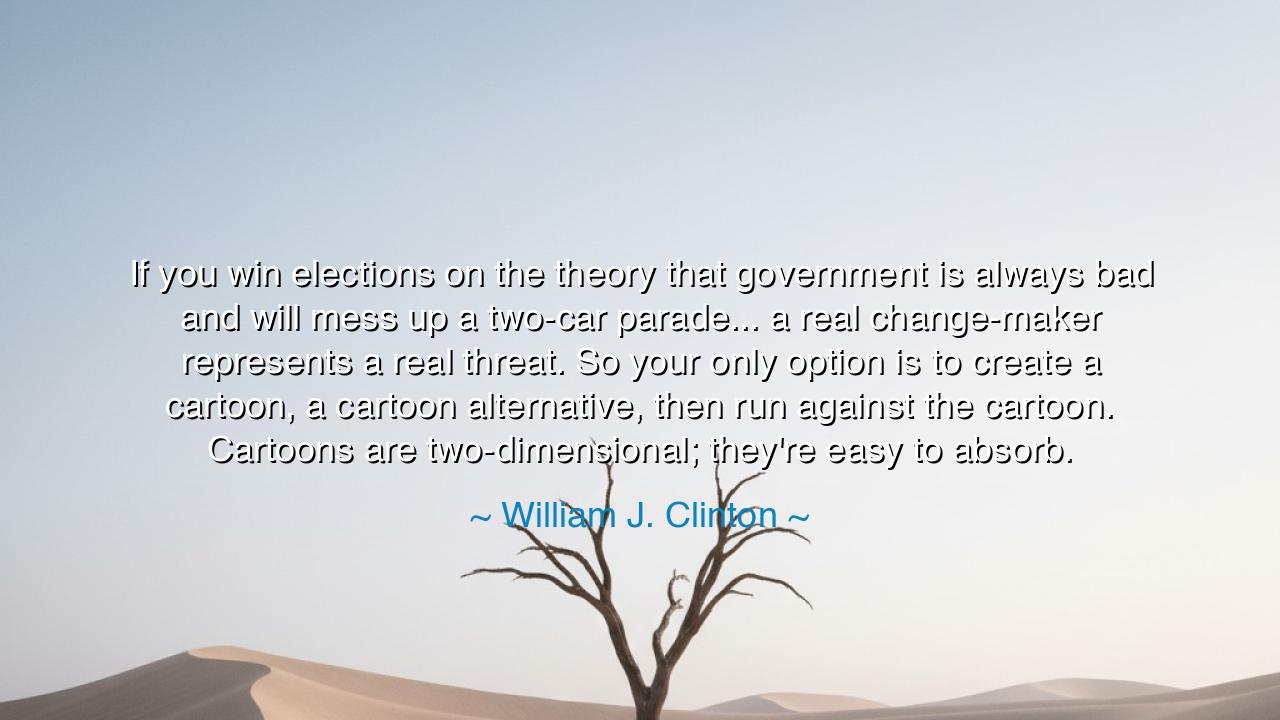
If you win elections on the theory that government is always bad
If you win elections on the theory that government is always bad and will mess up a two-car parade... a real change-maker represents a real threat. So your only option is to create a cartoon, a cartoon alternative, then run against the cartoon. Cartoons are two-dimensional; they're easy to absorb.






"If you win elections on the theory that government is always bad and will mess up a two-car parade... a real change-maker represents a real threat. So your only option is to create a cartoon, a cartoon alternative, then run against the cartoon. Cartoons are two-dimensional; they're easy to absorb." — William J. Clinton
Hear, O sons and daughters of democracy, the words of William J. Clinton, a man who rose from humble beginnings to speak of power with both candor and craft. In this saying, he unveils the ancient struggle between truth and illusion, between those who seek to govern for the common good and those who profit by reducing the world to caricature. When he said, “If you win elections on the theory that government is always bad,” he was not merely speaking of politics, but of the slow poisoning of belief itself — the loss of faith in the possibility of collective good. He warns that when cynicism becomes creed, those who dare to create, to improve, to change, are painted as monsters — not because they are false, but because they are real.
The origin of these words lies in the great conflict of ideas that shaped modern America. Clinton, speaking from his long years of political combat, had seen how some built their power not on building faith, but on destroying it. They taught the people to distrust their own institutions, to mock the very notion that government could serve the common man. And so, when a leader rose who sought to mend the fabric — to heal, to educate, to reform — that leader became dangerous, not because of failure, but because of potential. Thus Clinton declared that such men and women are turned into cartoons: flattened, simplified, stripped of humanity, until they are easy to hate and easier to defeat. For in the realm of public opinion, a cartoon is easier to consume than a complex truth.
In every age, this tactic has been the weapon of those who fear change. Consider the fate of Socrates, who stood before the people of Athens not as an enemy, but as a teacher. Yet his enemies, unable to face the depth of his questions, drew a cartoon of him — a corrupter of youth, a mocker of the gods. The people, who had once admired his wisdom, turned against him. They condemned him to drink poison, not because he was guilty, but because they had been taught to see a lie more easily than the truth. Thus, even in ancient times, the cartoon conquered the conscience, and the hero was silenced by simplicity.
Clinton’s metaphor of the two-car parade strikes with wry wisdom. It reveals how cynicism about government begins in jest and ends in ruin. To say that government “will mess up a two-car parade” is to mock all attempts at cooperation — to plant the seed of distrust that grows into paralysis. When such thinking rules a nation, leaders no longer seek solutions; they seek enemies. They create two-dimensional villains, simple shapes to rally against, rather than engage with the hard work of progress. It is easier to destroy than to build; easier to sneer than to serve. But as Clinton reminds us, when governance becomes a stage of cartoons, truth itself perishes in laughter.
The deeper meaning of this quote lies in the defense of complexity, of nuance, of honest debate. Real governance — like real virtue — is messy, imperfect, and human. It requires patience, wisdom, and the courage to act even when results are uncertain. But those who thrive on division cannot afford to let the people see this truth. For if the people saw the complexity of their world, they might begin to understand each other again. They might stop fearing government as an enemy and start demanding that it become an instrument of good. And that awakening, Clinton warns, would shatter the cartoon and reveal the real power of unity.
In this, there lies a timeless truth. The same pattern has been repeated in many lands. In every nation where progress threatened the comfort of the powerful, reformers were reduced to caricature. The abolitionists were called fanatics; the suffragettes, hysterical; the civil rights leaders, dangerous agitators. Yet behind each cartoon was a living soul, a voice that refused to be silenced. History has shown that the cartoon fades, but the truth endures — for reality, however complex, cannot be erased forever by ink and illusion.
So, my children of reason, take this teaching to heart: beware of the cartoon. When you see a leader mocked as a fool, when an idea is dismissed as impossible, look deeper. Ask who benefits from your laughter. Do not let your vision be flattened into slogans or your heart turned by caricature. Truth is never simple; progress is never perfect; but both are sacred. Seek the full picture, not the painted mask. For the destiny of every free people depends not on those who shout the loudest, but on those who refuse to see the world in two dimensions. In the age of noise and illusion, to see clearly is the greatest act of courage.






AAdministratorAdministrator
Welcome, honored guests. Please leave a comment, we will respond soon